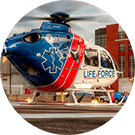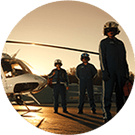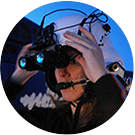Bradley Childress has flown more than 2,000 patients.
There are more than 1800 pilots and medical crew members who work for Air Evac Lifeteam, and only one percent of employees achieve the 2,000 patient flights milestone. Bradley Childress, Base Pilot Supervisor for the Harlan, Ky., Air Evac base, recently reached that pinnacle.
Childress started his career with Air Evac in August 2009, soon after the Harlan base opened. He built his flight hours flying tours in eastern Tennessee and for corporations. He made the move to Helicopter Air Ambulance and chose Air Evac Lifeteam because of the company’s mission to serve rural communities.
“I worked in Harlan for a couple of years before moving here,” Childress said. “I loved the area, and my wife’s family is from here.”
Childress and his wife, Rachel, live in Harlan with their daughters Emma and Adeline.
He said the best part of his job is getting to help the people in and around Harlan. “I also get to work with so many wonderful people, including my own Air Evac crews, and living in Harlan gives me the opportunity to be involved in the community.”
Jonathan Price, Program Director for the Harlan Air Evac base, said Childress is an integral part of the base’s success.
“His commitment to the surrounding communities is second only to his commitment to safety,” Price said. “Not only is Brad the Base Pilot Supervisor, he has also served as the Base Safety Representative for many years. Air Evac Lifeteam 88 is very lucky to have such an outstanding pilot and leader.”
Childress has seen many safety advancements since he began his career with Air Evac Lifeteam. The company was the first in the nation to be 100 percent Night Vision Goggle (NVG)- equipped.
“That was huge for us, flying in the mountains,” Childress said. “The autopilot and the Stability Augmentation System, along with the glass cockpit…those are game-changers when it comes to being able to care for patients safely. The investment Air Evac Lifeteam makes in its aircraft and employees is significant. When it comes to crew and patient safety, they don’t spare a dime.”



